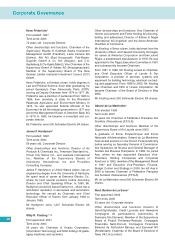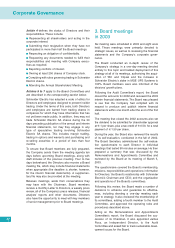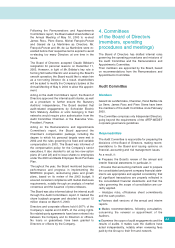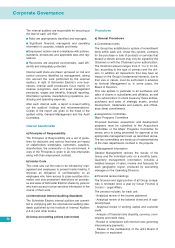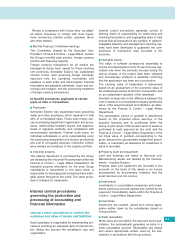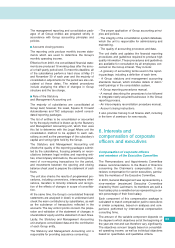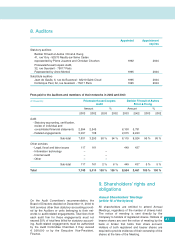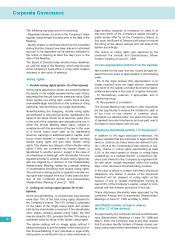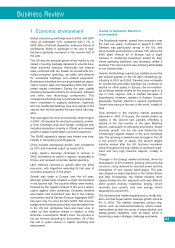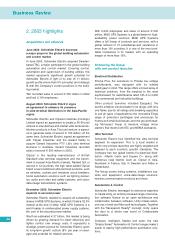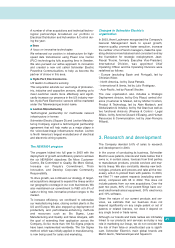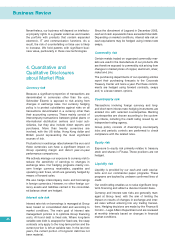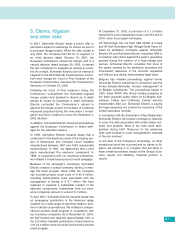APC 2003 Annual Report Download - page 40
Download and view the complete annual report
Please find page 40 of the 2003 APC annual report below. You can navigate through the pages in the report by either clicking on the pages listed below, or by using the keyword search tool below to find specific information within the annual report.
■Accrued taxes
The subsidiaries are responsible for calculating,
accruing and managing their taxes, except in some
cases where the subsidiary concerned is a member
of a tax group.
The Tax unit within the Finance & Control – Legal
Affairs Department reviews the current tax charge.
Originally, these checks were performed mainly for
French tax, but they are now also carried out on the
tax charge reported by the Group's main internation-
al subsidiaries, essentially in the European Union
and the United States. The Tax unit is also responsi-
ble for overseeing the resolution of tax claims.
The Statutory and Management Accounting unit with-
in the Finance & Control – Legal Affairs Department
performs six-month reviews of the Group's current
and deferred tax position.
The procedure includes performing analytical
reviews of the main subsidiaries' tax position, prepar-
ing the tax proof validating the Group's effective tax
rate, and analyzing changes in deferred tax assets
and liabilities by category of tax basis.
■Provisions for contingencies and charges
Group policy consists of recording provisions for con-
tingencies and charges in the accounts of the indi-
vidual subsidiaries. Claims and litigation are general-
ly managed jointly by the subsidiary and the Finance
& Control – Legal Affairs Department.
Provisions for contingencies are adjusted whenever
necessary. Movements recorded by subsidiaries are
required to be evidenced and are checked for com-
pliance with the applicable accounting standards.
■Provisions for pensions
and other post-retirement benefit obligations
The subsidiaries are responsible for managing their
employee benefit obligations under compulsory and
company-sponsored plans. Group policy consists of
systematically recording provisions for statutory
length-of-service awards due to employees on retire-
ment, pensions and healthcare costs paid on behalf
of retired employees in all countries where the Group
has an obligation under the related plans. These obli-
gations are reviewed annually by the Finance &
Control – Legal Affairs Department.
■Long and short-term debt
Net debt is managed at Group level by the Finance &
Control – Legal Affairs Department. Where appropri-
ate, cash pooling agreements and currency position
management agreements are set up to profit from
economies of scale and minimize financing costs.
Decisions concerning the financing of subsidiaries
are made by the Finance & Control – Legal Affairs
Department. The bulk of their financing needs are
met by short-term intercompany loans in their local
currency, but in some cases the Corporate Treasury
Center may decide to obtain external financing.
Long-term debt is managed at Group level.
■Off-balance sheet commitments
The off-balance sheet commitments of newly-
acquired subsidiaries are reviewed and analyzed
when the company joins the Group. Financial guar-
antees are issued by the Finance & Control – Legal
Affairs Department. A consolidated statement of off-
balance sheet commitments is produced at six-
month intervals by the Statutory and Management
Accounting unit which performs analytical reviews to
check the data. Other legal commitments are tracked
by the Legal Affairs unit.
Procedures for the production
of accounting and financial information
■The accounting system
The Statutory and Management Accounting unit of
the Finance & Control – Legal Affairs Department
has launched a project to standardize management
reporting processes among the various subsidiaries
by rolling out an integrated SAP system across the
entire Group. Subsidiaries in France, Spain, certain
other European countries and China have already
migrated their statutory and management accounting
systems to SAP. An SAP configuration model for use
by all Group entities is currently being developed and
will be implemented in phases over the next few
years.
The accounts of the subsidiaries are prepared in
accordance with Group accounting policies.The data
are then adjusted, where necessary, to produce the
local statutory and tax accounts.
Consolidation software is used for statutory and
management reporting purposes and also to pro-
duce the Group financial statements. The main
reporting processes cover monthly actual and fore-
cast data and consolidation.
■System design,
database and accounting standards
Schneider Electric’s consolidated financial state-
ments are prepared in accordance with French gen-
erally accepted accounting principles.
The consolidated financial statements comply with
the fundamental principles of fairness, prudence,
consistent application of accounting methods, segre-
gation of accounting periods, and separate recogni-
tion of assets and liabilities. They are prepared on a
going concern basis using the historical cost con-
vention. Amounts reported in the closing balance
sheet are automatically taken up in the opening bal-
ance sheet for the next period.
Group accounting policies take into account the
forthcoming adoption of IFRS by all European Union
countries.
Corporate Governance
38




